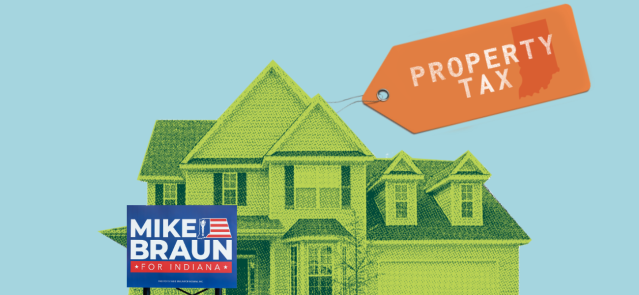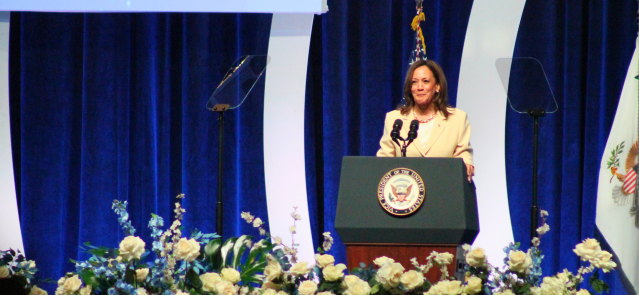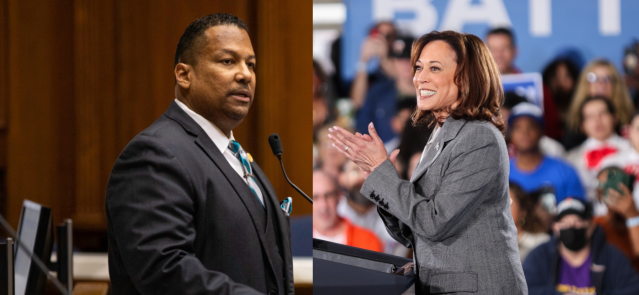Stay ahead of the curve as a political insider with deep policy analysis, daily briefings and policy-shaping tools.
Request a DemoHolcomb addresses final 2 bills of legislative session
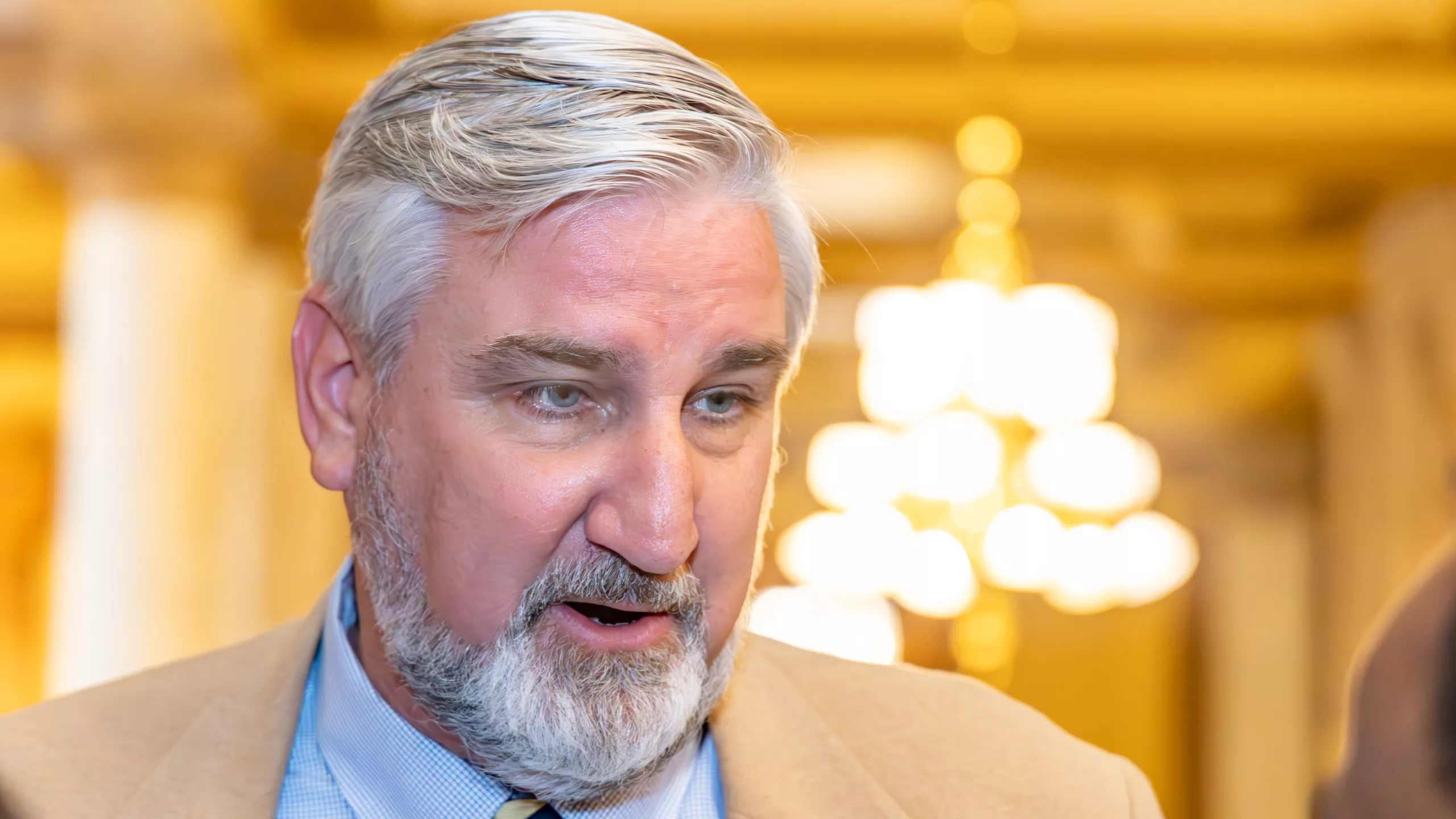
Gov. Eric Holcomb speaks following a Statehouse event on Dec. 1, 2023. (Credit: Mark Curry)
Gov. Eric Holcomb on Monday issued his only veto from this year’s legislative session in declining to sign an antisemitism bill that some Jewish groups and others argued was too weak.
The governor’s final action on the 172 bills approved by lawmakers was signing into law one that weakens the public access counselor’s office, which reviews questions from the general public and others about the state’s open meetings and public records laws.
Holcomb’s veto of the bill addressing antisemitism on college campuses came despite the Indianapolis Jewish Community Relations Council applauding the Legislature’s nearly unanimous vote supporting it.
The Gist
Indiana legislators wrapped up their 2024 session in the final hours Friday with votes not to immediately intervene in proposed cuts to Medicaid programs while approving a bill aimed at discouraging antisemitism.
The nine-week legislative session also saw Republicans push through a proposal aimed at improving young students’ reading skills that critics maintain will hurt potentially thousands of children who could have to repeat third grade.
In addition, lawmakers reached a final-day deal to give a pension boost to retired state employees through a so-called 13th check. But a proposal exempting tampons and other feminine hygiene products from the state’s 7% sales tax failed without facing a vote.
Here’s a look at some of the top legislation from this year’s session:
Education
- Third grade literacy: The Senate and House have approved Senate Bill 1. It aims to boost young students’ reading proficiency because nearly 1 in 5 third graders failed the state’s reading exam last year. It would require schools to provide summer school courses for second and third graders not meeting reading expectations. Many educators and Democrats opposed a contentious provision that would require schools to retain third graders who are unable to pass the reading exam and don’t qualify for an exemption. Gov. Eric Holcomb signed into law March 11.
- College faculty tenure: The Senate and House have approved Senate Bill 202, whose supporters say is meant to improve “intellectual diversity” on state university campuses that aren’t as welcoming of conservative viewpoints. University officials and faculty members opposed the bill, saying that steps such as requiring professors to face tenure reviews every five years would hurt schools’ ability to attract and retain top academics. Gov. Eric Holcomb signed into law March 13.

- Antisemitism: Gov. Eric Holcomb vetoed a compromise that House and Senate Republicans reached in a final version of House Bill 1002, which would have added a definition of antisemitism to the state’s education law and classify it as religious discrimination. Several Jewish students recounted discriminatory incidents on Indiana college campuses, but the bill faced protests from pro-Palestinian demonstrators concerning Israel’s military actions during that country’s ongoing war with Hamas in Gaza. The bill’s final version included a definition of antisemitism adopted by the International Holocaust Remembrance Alliance in 2016 but excluded its 11 “contemporary examples” of antisemitism, such as “drawing comparisons of contemporary Israeli policy to that of the Nazis.” Holcomb said in his veto statement, “While I applaud the General Assembly’s effort to address and define antisemitism, I cannot agree with the outcome.” The House voted 99-0 and the Senate 45-1 to approve the bill. Gov. Eric Holcomb vetoed the bill March 18.
- Religious instruction: The Senate gave final approval Friday to House Bill 1137, which would require school principals to allow students, with a parent’s permission, to receive up to two hours of religious instruction a week during school hours. The final version of the bill dropped a provision that would have allowed schools to employ religious chaplains as counselors. The House voted 69-25 on Thursday in favor of the bill. The Senate approved it in a 32-16 vote Friday. Gov. Eric Holcomb signed it into law March 13.
Economy
- Teen workers: Under House Bill 1093, 16- and 17-year-olds would no longer have any restrictions on when and how many hours a week they can work. Current state law allows them to work only until 10 p.m. on a school night without parental permission and prohibits them from working more than 40 hours in a school week. Supporters say the move will give teens more workplace experience and bring Indiana’s youth labor laws more in alignment with federal law. The Senate approved the bill Tuesday in a 39-9 vote. The House voted 62-31 on Wednesday in favor of the bill. Gov. Eric Holcomb signed it into law March 13.
- IEDC oversight: A proposal aimed at increasing oversight of the Indiana Economic Development Corp. failed amid ongoing debate over how the state agency has handled the LEAP Lebanon Innovation District. Senate Bill 295 calls for adding two members of the Legislature to the IEDC’s governing board as nonvoting representatives. It also would require the agency to notify a county or municipality before it purchased land exceeding 100 acres. The Senate approved the bill by a wide margin, but the House never took action on it. Bill failed.
- LEAP District pipeline: Bills filed in reaction to public objections over a proposed 35-mile pipeline for shipping water from a Wabash River aquifer in Tippecanoe County to the IEDC’s LEAP District failed. House Bill 1305 and an identical Senate bill sought to limit water withdrawals without state permits, but Republican leaders were against advancing legislation until a study of the aquifer is completed. Neither the House nor the Senate took up the bills.
Online activities
- Porn site restrictions: Legislators approved requiring websites featuring pornography to verify the user’s age to prevent minors from accessing adult content. Senate Bill 17 would require those wanting to access adult-oriented websites to provide their ID as proof they are at least 18 years old. Gov. Eric Holcomb signed it into law March 13.
Health and safety
- Medicaid: Legislators did not give directions to state Medicaid officials on cuts that have been proposed since officials in December revealed nearly $1 billion in unexpected costs. Provisions added to House Bill 1120 instruct the Holcomb administration to provide lawmakers with details on possible cuts to an increasingly costly program that compensates parents and guardians providing attendant care to their disabled children. Also, Medicaid officials will have to present a report on how the forecasting error occurred. The Senate approved the bill in a 42-5 vote Friday, with the House voting 96-0. Gov. Eric Holcomb signed it into law March 13.
- Tampon tax: A proposal exempting tampons and other feminine hygiene products from the state’s 7% sales tax failed Friday when it was not included by Republican negotiators in any bills. The move’s supporters believed they would be successful after it was part of a bill that won unanimous approval in the House. Democrats have sought for several years to exempt those products from the sales tax, joining groceries and medicines in being untaxed. Proposal failed.
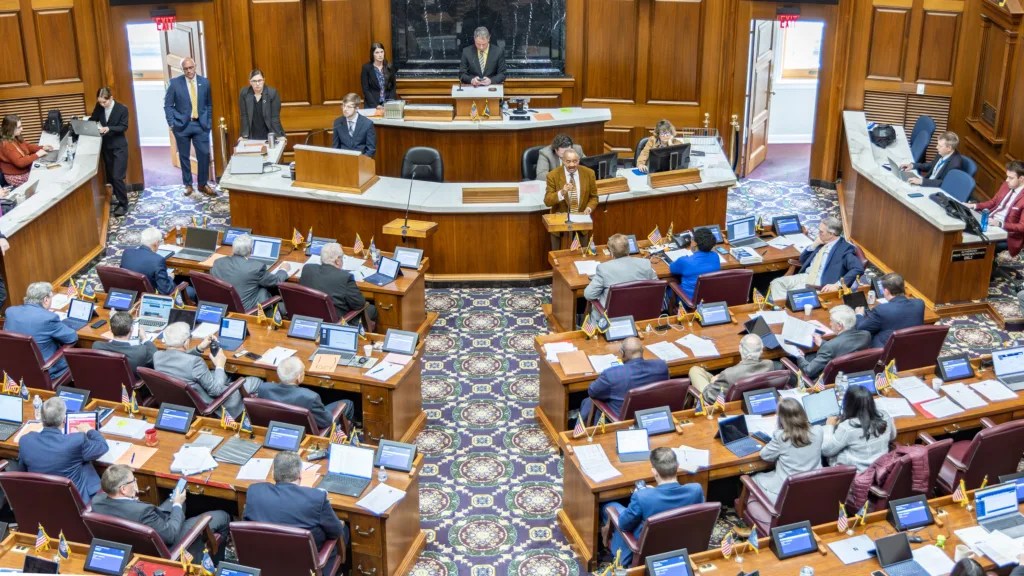
- Lead water pipes: Lawmakers pushed through Senate Bill 5, which would enable water companies to remove lead service pipes to homes when property owners, oftentimes landlords, are unresponsive. Indiana has hundreds of thousands of such pipes across the state. The bill’s aim is to help water companies more easily meet a proposed federal rule requiring lead service lines to be replaced within a decade. Gov. Eric Holcomb signed into law March 11.
- Prior authorization: A proposal to significantly restrict the use of prior authorization failed amid concerns it could impact the already ballooning costs to administer Medicaid in the state. Under Senate Bill 3, insurance providers would have been prohibited from requiring insurance approval for emergency services — such as when someone needs their appendix removed, — routine care and prescription drugs. It was a top-priority bill of Senate Republicans, but fiscal leaders had questions about the possible state budget impact. Bill failed.
Open government
- Public access counselor: Senate and House Republicans approved putting strict limitations on what legal research Indiana’s public access counselor could consider in reviewing open government matters. Republican senators added provisions to House Bill 1338 that supporters of the access counselor’s office argue would hamstring its ability to answer questions about the state’s open meetings and public records laws. The Senate approved the bill Tuesday in a 40-8 vote. House members voted in favor of it 58-36 on Wednesday. Gov. Eric Holcomb signed the bill March 18.
Pensions
- Pension benefits: Legislators agreed Friday to provide a pension boost to retired state employees through a so-called 13th check. The House and Senate both voted in favor of House Bill 1004, which would provide anywhere from $150 to $450 to about 165,000 state and local government retirees. It also directs the Indiana Public Retirement System to prepare for providing 13th checks annually to older pensioners and cost-of-living adjustments, or COLAs, to younger ones. The House voted 98-0 and the Senate 44-3 in favor of the bill Friday. Gov. Eric Holcomb signed it into law March 13.
Environment
- Wetlands: Indiana’s wetlands protections were modified with House Bill 1383, which Republicans pushed through despite strident objections from environmentalists. It was the first bill to gain final legislative approval on Feb. 6, which opponents argued was done to stifle public debate. The bill changes the definitions of the most highly protected Class III wetlands and allows the shift of some of those wetlands to categories with lower levels of protections. Signed into law by Gov. Eric Holcomb on Feb. 12.
- PFAS regulations: Senate Republicans on Thursday blocked House-backed legislation that would have eased state regulations on synthetic substances known as PFAS. The proposal — which environmentalists denounced as a dangerous risk to public health — had been revived by House Republicans on Wednesday after the original bill in which it was included failed to advance in the Senate. These “forever chemicals” are known for not breaking down in the environment, but manufacturers argue they need assurance for the use of some PFAS compounds in medical devices, drugs and other products. Bill failed.
Local control
- Dog sales: About 20 Indiana cities will have local ordinances banning dog sales at pet stores overturned as Republicans pushed through House Bill 1412. The bill sets up statewide inspections of commercial dog breeders and brokers, but opponents argued that the inspection system will be inadequate to prevent puppy mill abuses. Signed into law by Gov. Eric Holcomb.
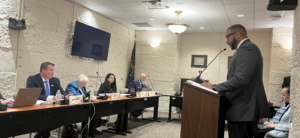
- Gary gun lawsuit: Republicans have backed a new attempt aimed at quashing the city of Gary’s long-running lawsuit against gun manufacturers. House Bill 1235 would prohibit local governments from filing such lawsuits, with only the state attorney general having such authority. Gary’s lawsuit claiming that actions by gun manufacturers were fueling gun violence in the city has inched through the court process since the suit was filed in 1999. Republican lawmakers pushed through a similar bill in 2015 that intended to stamp out the lawsuit, but the state Supreme Court in 2019 upheld lower court rulings allowing the suit to continue. The House voted 64-25 on Tuesday to give final approval. Gov. Eric Holcomb signed it into law March 15.
Marijuana and referendums
- Marijuana: Republican legislative leaders again refused to take up any bills on marijuana legislation for medical or recreational use. Numerous such bills have failed to advance over the past decade even as a Ball State University poll found 86% support among Indiana residents for some form of marijuana legalization and all of Indiana’s surrounding states allow some type of cannabis use. Bills failed.
- Ballot referendums: Republicans rejected efforts by Democrats to possibly allow citizen-led ballot referendums in the state. Democrats filed legislation to amend the state constitution to create a process by which petition drives that gather enough voter signatures could place issue questions on the general election ballot. Such a process in Ohio resulted in voters there approving in November a constitutional amendment protecting abortion access and a law legalizing medical marijuana. Proposals failed.
Why It Matters
Legislators faced a flurry of activities to reach agreements on dozens of bills concerning topics large and small in the session’s final week. The General Assembly faced, by state law, a deadline of adjourning this year’s session no later than March 14. Top Republican leaders, however, set Friday, March 8, as their target date for wrapping up legislative action.
What’s Next?
Republican Gov. Eric Holcomb will make decisions over the coming weeks on all the bills winning approval from legislators.
The governor has seven days from when the paperwork reaches his office to sign a bill into law, let it become law without his signature or veto the legislation. Indiana’s governor has a “weak veto,” with legislators able to override any vetoes with a simple majority from both the House and Senate.
The governor’s office maintains a 2024 Bill Watch page, where the public can follow the status of legislation.
This is Holcomb’s eighth and final regular legislative session as governor. He is term-limited and can’t seek reelection this year. Six Republicans and one Democrat are on the May primary ballot seeking their party nominations for governor, with the winner of the November election taking office next January.
Tom Davies is a Statehouse reporter for State Affairs Pro Indiana. Reach him at [email protected] or on X at @TomDaviesIND.
X @StateAffairsIN
Facebook @stateaffairsin
Instagram @stateaffairsin
LinkedIn @stateaffairspro
4 things to know about Braun’s property tax proposal
Sen. Mike Braun, the Republican candidate for Indiana’s governor, released a plan for overhauling property taxes Friday morning that would impact millions of Hoosiers, Indiana schools and local governments. “Nothing is more important than ensuring Hoosiers can afford to live in their homes without being overburdened by rising property taxes driven by rapid inflation in …
Bureau of Motor Vehicles looks to add new rules to Indiana’s driving test
The Bureau of Motor Vehicles wants to amend Indiana’s driving skills test, putting “existing practice” into administrative rule. Indiana already fails drivers who speed, disobey traffic signals and don’t wear a seatbelt, among other violations. Yet the BMV is looking to make the state’s driving skills test more stringent. A proposed rule amendment looks to …
In Indianapolis, Harris says she’s fighting for America’s future
Vice President Kamala Harris, the presumptive Democratic presidential nominee, told a gathering of women of color in Indianapolis on Wednesday that she is fighting for America’s future. She contrasted her vision with another — one she said is “focused on the past.” “Across our nation, we are witnessing a full-on assault on hard-fought, hard-won freedoms …
Indiana Black Legislative Caucus endorses Harris, pledges future support
The Indiana Black Legislative Caucus unanimously voted Wednesday to endorse Vice President Kamala Harris’ presidential run and will look at ways to assist her candidacy, the caucus chair, state Rep. Earl Harris Jr., D-East Chicago, told State Affairs. The caucus is made up of 14 members of the Indiana General Assembly, all of whom are …
